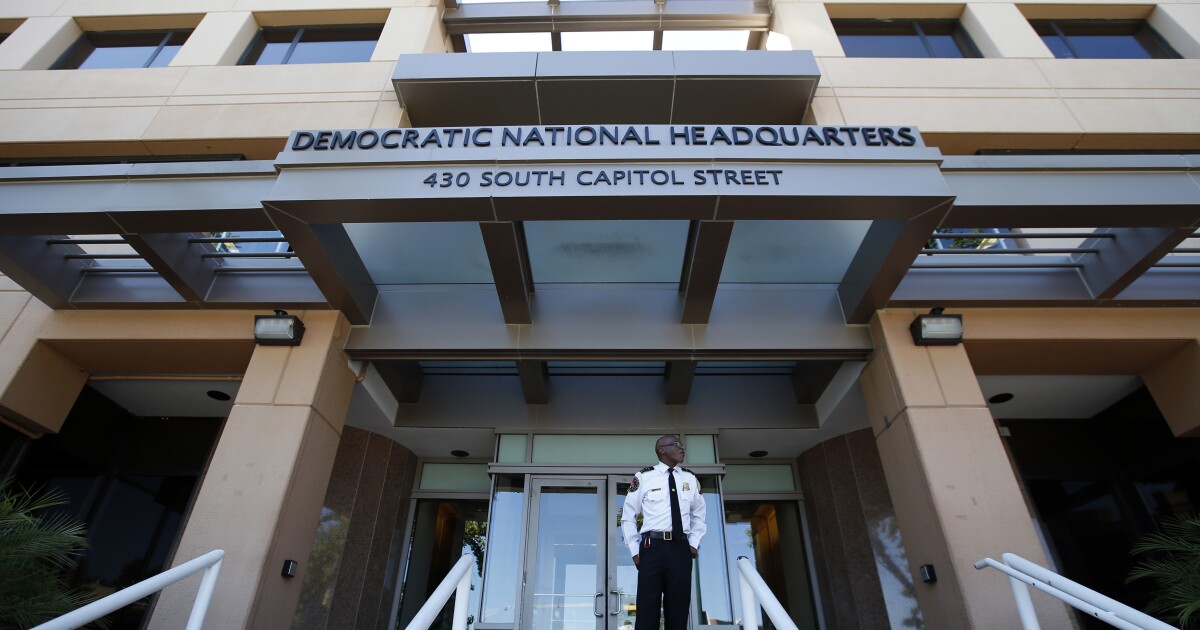

Democrats voted on Friday to boot Iowa from its long-held and widely coveted spot as first in the nation for the party’s presidential primary calendar, replacing the state in 2024 with South Carolina.
Iowa has long led the way in the nominating process, typically holding its caucuses one week before New Hampshire’s primary, followed by Nevada and South Carolina. However, Democrats are shaking things up for 2024, with the Democratic National Committee’s Rules and Bylaws Committee voting for an entirely new early voting lineup.
DNC SET TO SHAKE UP PRESIDENTIAL NOMINATING CALENDAR
The decision to update the lineup had been on Democrats’ minds for years, but the conversation received renewed attention after the 2020 caucuses in Iowa were crippled by technological difficulties that delayed the vote count for several days. Democrats also griped that since Iowa lacks diversity, it’s no longer representative of the U.S. population.
Ahead of a vote on the changes, President Joe Biden released his much-anticipated proposal for 2024’s presidential primary calendar on Thursday, requesting that South Carolina be chosen to host the first presidential primary, followed by Nevada and New Hampshire on the same day one week later, then Georgia, and finally Michigan. The proposal, which the DNC panel approved on Friday, removes Iowa from the mix altogether while adding a fifth state.
The full DNC will have to vote on the nominating calendar sometime early next year, but the lineup is expected to be final.
For each of the five states Democrats ended up choosing, here’s why they likely made the cut as well as some perceived drawbacks.
South Carolina
South Carolina was added to the early voting states 16 years ago, along with Nevada, in order to bring more demographic diversity into the mix. The Palmetto State has typically gone third but is slated to become first following Biden’s request to the DNC.
Having South Carolina as the first primary state lends Biden an advantage if he chooses to run again in 2024. The Southern state helped secure his win during the 2020 election and would likely nominate the president with big numbers over any Democratic challengers next cycle. South Carolina is also home to a large black population, a crucial voting bloc for Democrats.
However, South Carolina is a red state that generally votes in favor of Republicans, meaning any investment would only benefit Democratic performance in the primaries, not the general election.
New Hampshire
New Hampshire has prided itself on holding the nation’s first primary election for years, and Gov. Chris Sununu (R-NH) is not planning to change that.
New Hampshire benefits from being a small state, meaning candidates can directly engage with voters at affordable costs. The state is also a key battleground in the general election, so an early start campaigning in New Hampshire could help Democratic chances by the time the November election rolls around.
However, opponents say New Hampshire also lacks voter diversity and isn’t representative of the U.S. population — arguing it should be replaced with similarly small states that are home to a wider range of racial and ethnic backgrounds.
Despite pushback from New Hampshire lawmakers, the DNC Rules and Bylaws Committee voted to levy severe penalties on any state Democratic Party that chooses to ignore the national party’s new order of voting and schedule its primary or caucus ahead of Super Tuesday.
The Democratic Party in New Hampshire, where state law mandates the first-in-the-nation primary be held there, has already signaled it will defy that stipulation if stripped of its No. 1 spot.
“The DNC did not give New Hampshire the first-in-the-nation primary and it is not theirs to take away. This news is obviously disappointing, but we will be holding our primary first,” state party Chairman Ray Buckley said in a statement. “We have survived past attempts over the decades and we will survive this.”
Nevada
Like South Carolina, Nevada was added to the early lineup in 2008 thanks to its status as a battleground state and its growing diversity. Now, the Western state will move up in the ranks and hold its nominating contest on the same day as New Hampshire.
Sen. Catherine Cortez Masto (D-NV) pushed heavily for Nevada to take over an early primary slot, arguing the state’s battleground status makes it a key investment for Democrats.
“Nevada is a state that really — that wants people to vote, protects the right for people to vote,” Cortez Masto told MSNBC this week. “And remember, Nevada is beautifully diverse. I think it’s a microcosm of the rest of the country. If you’re a presidential candidate and you can win in Nevada, you have a message that resonates across the country.”
Nevada’s history of being an early state is also an advantage because voters have long embraced the mantle. However, the Silver State suffers from being incredibly large geographically, meaning candidates who are campaigning must travel far just to get from Reno to Las Vegas.
Georgia
Georgia’s status as a battleground state and recent Democratic wins there in the 2020 and 2022 elections bolstered its chances of becoming an early vote state, especially as it’s home to several voting demographics crucial to the Democratic Party.
About 33% of its population is black, 10% is Hispanic, and 4.6% is Asian, according to the Census Bureau.
The state is also home to several colleges and universities, meaning there’s a large number of students who live there and are likely to vote in Democrats’ favor because younger voters tend to be more liberal.
However, Georgia’s size is a drawback because candidates will be tasked with covering more ground and the party will have to pour in additional money to ensure all bases are covered.
Michigan
With the midterm cycle barely in the rearview mirror, some states pointed to Democratic gains as evidence they should be bumped up in the calendar and replace Iowa to represent the Midwestern region. Among these is Michigan, where the party seized control of both state legislative chambers and reelected a Democratic governor.
Michigan features a number of rising stars within the Democratic Party, such as Gov. Gretchen Whitmer and Rep. Elissa Slotkin — giving the party a chance to cultivate a stronger reputation nationwide.
CLICK HERE TO READ MORE FROM THE WASHINGTON EXAMINER
Michigan is home to large urban and rural populations, something that made it an attractive replacement for Iowa, which lacks racial diversity in its electoral vote.
Democrats were particularly interested in its black voter population, yet others argued that Michigan lacks diversity in other key demographics, such as Hispanic or Asian Americans. Other opponents have pointed to Michigan’s large size, arguing its number of delegates is too high — almost reaching the number of early state delegates from New Hampshire, Nevada, and South Carolina combined.





